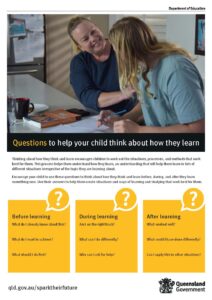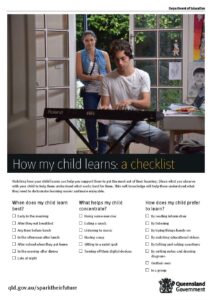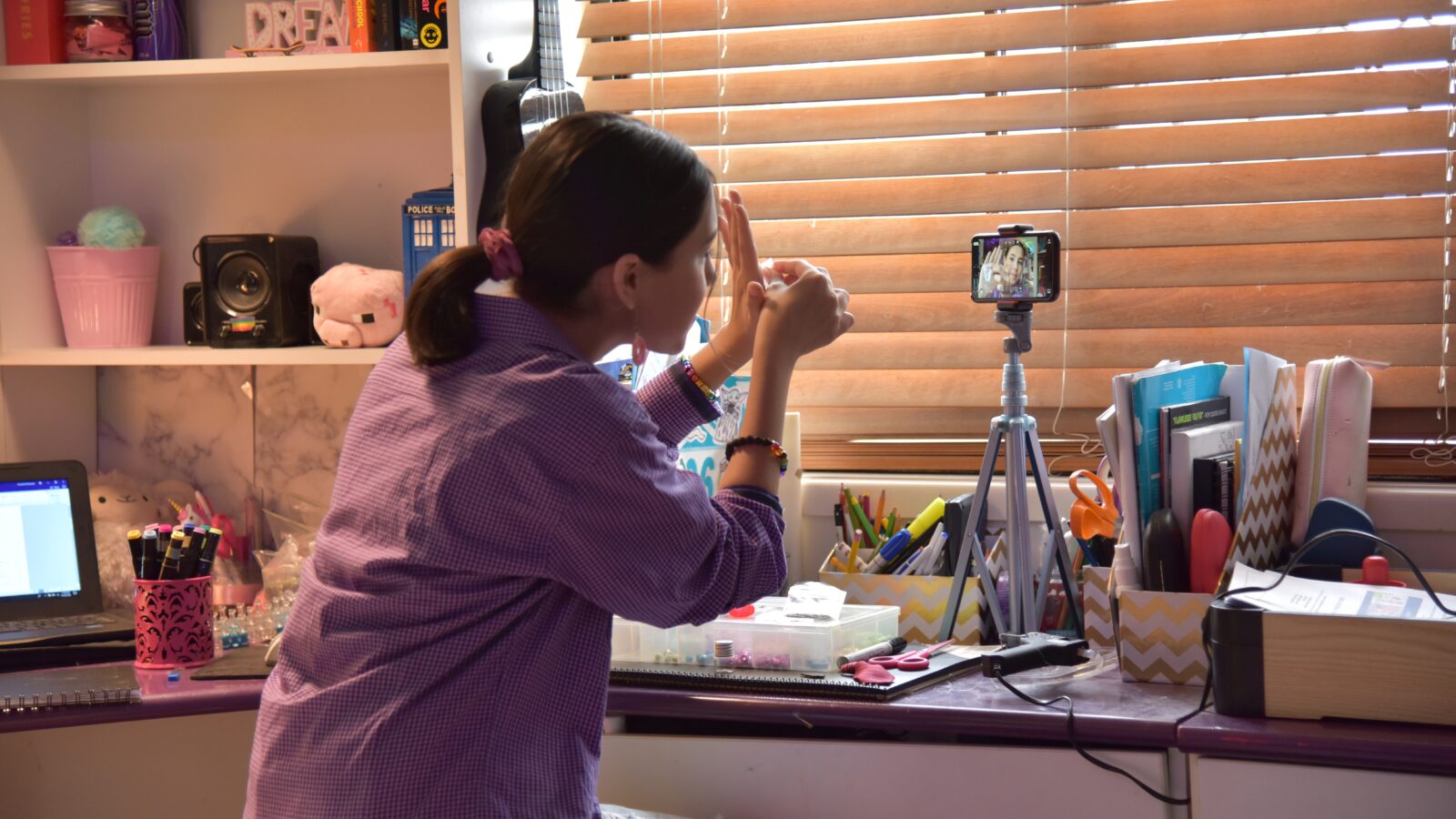Key Points
- You don’t need to understand everything your child is learning at school to help them learn.
- Talk to the school if your child is struggling with their school work. Your child’s school wants to work with you to help your child succeed.
- Encourage your child to ask their teachers for help if they need it.
- Asking your child the right questions (even if they don’t always know the answers), can help your child work out the answers for themselves.
- Help your child to learn through everyday experiences such as cooking, shopping and being outside in nature.
You don’t need to understand everything your child is learning at school to help them learn. What matters most is that you are there to support your child and able to get help for them when they need it. Here’s some tips on what you can do to help your child learn better.
Be positive about learning
You are your child’s first teacher and can shape their attitude to learning at school and at home. Talk positively about school and about your child’s teachers. Remember that children watch and copy what their parents say and do. Let your child see you reading books and when your child shows interest in something, encourage that spark by taking the time to answer their questions. If you don’t know something, it’s okay to say, ‘I don’t know. Let’s find out together.’ This way, you are showing your child it’s okay not to know stuff and fun to find out the answer and learn something new. And every now and then, remember to take a moment to remind your child of how far they’ve come. Talk about all the things they’ve learned during their time at school and celebrate their achievements. Celebrating little wins will open your child’s mind to what is possible and keep them motivated to learn more.
Talk to the teacher
It’s okay to talk to your child’s teacher and their school about any issue your child is having.
Don’t wait for a parent-teacher interview to raise any concerns you have. If you want to talk about what your child is learning at school or are worried that your child is struggling with some aspect of their learning, contact their teacher. You are not alone and the team at your child’s school is there to help you. If the teachers identify that your child has a learning difficulty, ask them questions so you can understand as much as possible about your child’s situation. Some questions you could ask include:
- Can you explain the problem my child is having?
- What can I do at home to help my child with this problem?
- Are there any websites or books I can read to help me understand the problem better?
- Is there anyone outside of school I should take my child to see so they can get further help?
Create a quiet space for learning
A quiet, comfortable and well-lit place to study, away from distractions, will help your child learn better.¹ This is especially important for teens who have more homework and school assignments to manage. Help your child maintain their concentration by reminding them to take regular breaks. Avoid screen time during the breaks and encourage your child to move around. Research has found that physical activity during study provides the brain with the oxygen-rich blood needed for higher performance and can improve your child’s alertness, attention and motivation. And have some healthy snacks on hand to fuel your child’s concentration and learning.
Help your child understand how they learn
Help your child understand how they think and learn. Thinking about thinking (also known as ‘metacognition’) can help your child work out the situations, processes and methods that work best for them to learn. Some children learn better in the mornings while some prefer to study after school; some children prefer to learn by reading while others prefer hands-on activities; and some children like to learn in groups while others prefer to work alone. By helping your child understand how they learn, you can create the right conditions to enable them to learn better.
Ask questions rather than giving answers
You don’t need to understand what your child is learning to help them with their study. By guiding them in the right direction, you can often help them to work out the answer for themselves. Here are some questions you can use to prompt your child’s thinking when they are struggling with a problem:
- What thinking did you use to get this far?
- What next step could you try?
- Is there another way to approach this?
- When you had a similar problem in class, how did you deal with it?
Let your child teach you
You can help your child learn by encouraging them to teach you what they are learning about. This approach is based on scientific research¹ and is known as the ‘protégé effect’. The protégé effect is what happens when someone pretends to teach another person and in doing so, learns the information they are teaching. Inviting your child to teach you something they are learning can be a very effective way to help them learn it – without them even knowing it. For younger children, you can set this up like a game where they are the teacher and you are the student. Most kids love this kind of role play. For older kids and teens, this approach can be a great way for you to connect with them and their learning in a way that is non-threatening and hopefully fun for both of you.
Use online resources
There are lots of online resources designed to help children and teens learn. Ask your child’s teacher if they can recommend any online resources you can use at home to support what your child is learning at school. Online resources such as Mathspace & WooTube (which focuses on secondary school maths) can support what your child is learning at school while allowing them to work through problems at their own pace at home. If you use online resources at home, check with your child’s teacher to make sure they come from a reliable source and align with what your child is learning at school.
Teach your child to ask for help
Children need to know how to ask for help when they are at school so they can seek help when they need it. Let younger children know that they should wait for a break in an activity or until the teacher has finished talking before they ask for help. Here’s some tips on what you can say to your child to encourage them to ask for help:
- Tell them that asking for help is a sign of strength. Explain to your child that everyone needs help sometimes and that refusing to ask for help when you are struggling could mean you miss out on valuable information.
- Explain to them that teachers want to help their students because it’s their job to help children learn.
- Give your child some conversation starters to help them ask for help, such as:
- I tried to do ______ but I’m still stuck. Could you help me please?
- I’m struggling with ______. Can we please talk about it later?
- I’ve listened to what you said but I still cannot understand _____. Can you please help me?
- Is now a good time to ask for help?
And when your child asks you for help, let them know you are glad they asked. The more positive their experience when they ask for help, the more likely they will be to ask for help the next time they need it.
Encourage learning in your day-to-day life
There are many informal ways you can help your child learn in everyday life; activities that will help them improve their reading and maths as well as developing other knowledge and skills. Here’s some ideas you might like to try:
For younger children:
- Cook or bake with your child and encourage them to read the recipe and measure out quantities.
- Play board games and card games to help them develop maths skills as well as problem solving and strategic thinking.
- When you are out shopping together, ask your child to try and work out the amount of change you are owed when you are buying things.
- When you are outside in nature, observe the birds and insects and plants and talk about what you see around you.
As they get older:
- Track the weather and encourage your child to record what they see every day. Your child might also like to build their own weather station.
- Investigate and document your family’s history using the Internet and through talking to other family members.
- When there are sales on in stores, get them to work out what the final discounted price will be.
- When travelling somewhere, ask them to work out what distance, how long or at what speed you’ll need to travel to get there on time.
- Travel in an elevator with a set of scales and an item and observe the changes in weight.
- Drop different items from a height and talk about how the wind resistance might slow some items down.
- Play more advanced board games which are great for building vocabulary, assessing probability, developing strategy, and solving problems.
If you are struggling with the technology your child needs for school
Some primary schools and all secondary schools require students to bring their own device to school to assist with their learning. This can be pretty daunting if you are not used to using technology yourself or having technology in your home. If you are having trouble dealing with the technology your child needs for school, please talk to your child’s school. Queensland state schools receive funding to employ an IT support person to assist students and their families with computer problems. The level of support will differ from school to school so talk to your child’s school to find out what support it can offer you. Also, all Queensland state school students can download multiple free copies of the latest Microsoft Office to their personal home computers and mobile devices. Students need to use their school email address to sign in. The Department of Education provides all Queensland state school students with their own email account so if your child is not sure of their email address, please talk to the school.
Your child lives in a digital world so it’s important for you to develop some understanding of their online activities. By getting involved with their digital learning and online activities, you can learn more about their online experiences and better understand the risks they may be exposed to. The eSafety Commissioner website provides parents and carers with advice to help children have safe online experiences.
And if your child has a disability or individual learning needs
You may already know your child has additional learning needs or you could be concerned that they might. Talk to the school and discuss your concerns with your doctor. Children develop at different rates and professionals are the best people to advise you on whether there is a need for follow-up testing or additional support. In the meantime, alerting your child’s school to your fears can help the school focus on any areas for concern, organise support staff to work with your child, and/or provide additional diagnostic information. And for some of you, the Autism Hub or the Reading and Writing Centre could be a useful place to gather information to help you support your child’s engagement at school.
More information
Queensland Department of Education student support and services
Queensland Department of Education learning resources
Australian Curriculum information for parents and carers
References
- Kobayashi, K, Interactivity: a potential determinant of learning by preparing to teach and teaching (2019)
Last Updated: 22 February 2024







